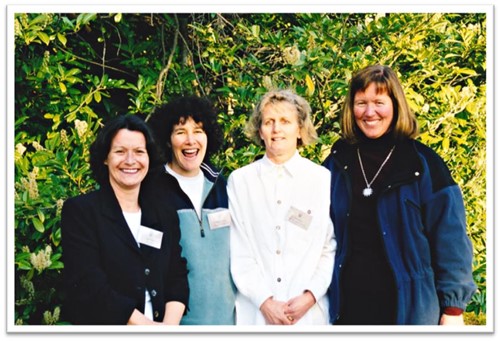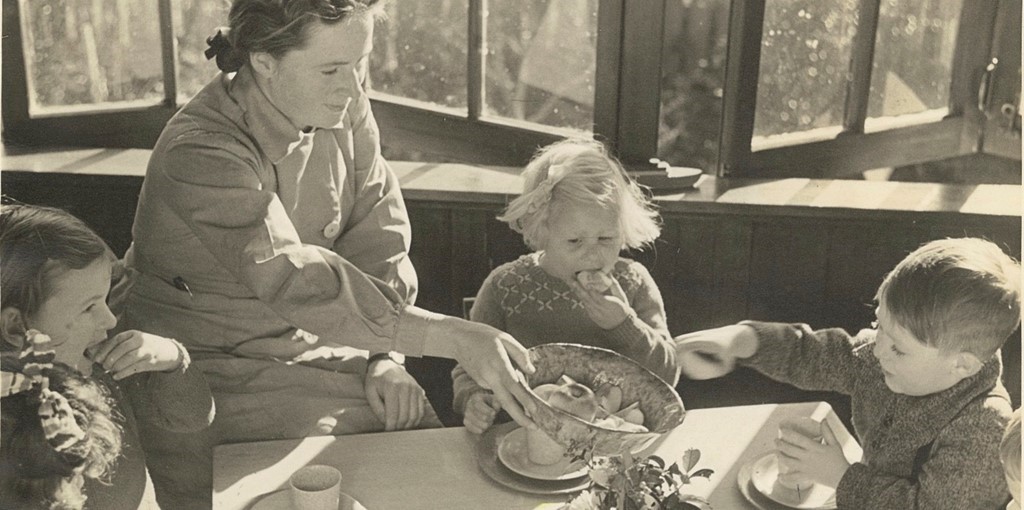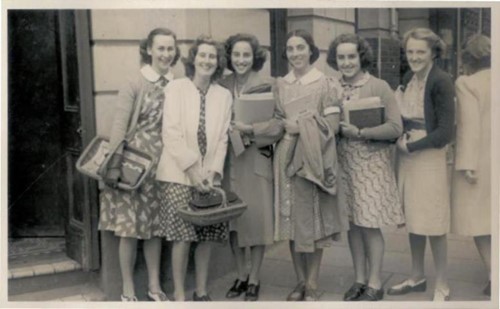Marjorie Sinclair, Taranaki St Nursery Kindergarten, 1940s, WRFKA.
Teachers and training from the 1880s on...
The nineteenth century teachings of Friedrich Froebel strongly influenced the nature of teachers of young children, how they should be trained and the pedagogical focus to be used.
Froebel’s kindergarten and his strong belief in women as the first teachers of children offered a significant career path for middle class women outside the home. Their perceived special talent for the nurture of small children was argued to be as critical in the public domain as it was in the domestic world. [i]
In New Zealand the notion of kindergarten teacher as a feminine occupation was firmly upheld along with the establishment of the first free kindergarten in Dunedin in 1889. This notion was widely reinforced such as with recruitment and employment advertisements seeking "young, single girls" and in the use of the pronoun "she" to refer to teachers in official documents such as the 1959 Kindergarten Regulations. Graduates were referred to as kindergartners or directors or assistant directors. Government funding specifically directed they could not be referred to as teachers.
Froebel’s model provided professional opportunities for middle class women at a time when women were not expected (or even allowed) to work outside the home. Most women entered teaching from school or in early adulthood expecting to follow the typical employment pattern of work as a prelude to their prime domestic role of marriage and motherhood. Whilst some women established long term teaching careers, for many, marriage ended their careers. Dorothy Page sums up the feeling of the times to say: "Marriage was a woman’s vocation; a career in the paid workforce was for the unmarried, and a second best alternative at that."[ii] Married women who worked became the focus of criticism from society. A statement by one churchman in 1954 was typical. The effect of their "selfishness" was "neglected families" and "a nation’s loose morals."[iii] Kindergarten teaching provided employment for single women who needed or sought to be come self supporting. Some were ambitious and intelligent women who found in kindergarten teaching, a field of work they found rewarding.[iv]
Student teachers, circa 1942. WFKA Taranaki Street Kindergarten Training School. Audrey Newton Photo Collection.
1952 saw the establishment of the New Zealand Free Kindergarten Teachers Association (KTA) and in 1958 the association was formally recognised as a professional and service organisation. Over the next two decades the association became a powerful political voice for teachers' concerns including salary, professional status, conditions of employment, as well as ongoing professional learning. In mid 2002, after extensive employment negotiation with Government, kindergarten teachers gained pay parity with primary teachers. In 1990 the KTA joined forces with the Early Childhood Workers Union to form the Combined Early Childhood Union of Aotearoa and in 1994 amalgamated with New Zealand Educational Institute.
In this way the feminisation of the role of teaching young children and the emergence of women in professional roles were two converging outcomes of the early days of kindergarten teaching. Influences that helped shape where the sector is today.

Past Presidents NZKTA. From left Clare Wells, Sarah (Mulheron) Te One, Lynne Bruce, Wendy Lee, Nelson 1999. Photo: Kerry Bethell Collection.
Footnotes
[i] Kindergartens in New Zealand, 1889-1975 [compiled and edited by P.M.Lockhart] (Dunedin, N.Z.: New Zealand Free Kindergarten Union), 1975.
[ii] Dorothy Page, The National Council of Women: A Centennial History, (Auckland: Auckland University Press/Bridget Williams Books with the National Council of Women) 1996, 82.
[iii] Dominion, 20 July 1954, p.20, cited in Shuker, R., and R. Openshaw, Youth, media and moral panic in New Zealand, (Palmerston North: Delta Research Monograph) 1990.
[iv] For example, see Sue Middleton and Helen May, Teachers talk teaching 1915-1995, (Palmerston North: Dunmore Press), 1997.



